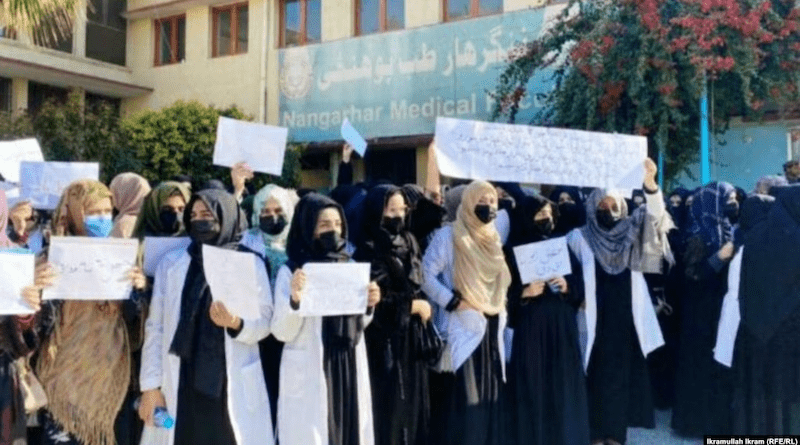Education Is Afghan Women’s Cardinal Right – OpEd
Islam, as a religion, has always placed great emphasis on education, and Prophet Muhammad (peace be upon him) was a great advocate for education for all, regardless of gender. In fact, the first verse revealed in the Quran to Prophet Muhammad was about the importance of reading and learning.
The Prophet Muhammad (peace be upon him) himself encouraged women to seek knowledge and even appointed women as teachers. In Islam it is the fundamental right of women to work and contribute to the economy. Islam recognizes the importance of women’s contribution to society, and earn a living. The great example is the wife of Prophet Muhammad’s (peace be upon him), Khadija, was a successful businesswoman who supported him both financially and emotionally.
In Islam, as long as women work within the set boundaries by Islamic laws, they can work outside and there is no restriction on women. In fact, many Muslim women throughout history have been highly educated and successful in their chosen careers, from medicine to literature to politics. However, despite the fundamental right of women and girls to access education and work, there are still various obstacles that they face in many parts of the world. Discrimination, cultural norms, and lack of resources are just a few of the barriers that prevent women and girls from accessing education and work.
Pakistan, as a Muslim-majority country, strongly believes that girls’ education is not only a fundamental right but also a moral and religious obligation as also mentioned by the Pakistan’s foreign minister in his recent speech at UNSC. Pakistan has a long history of promoting education, with many renowned educational institutions, including universities, colleges, and schools, established across the country. In addition to government initiatives, several non-governmental organizations (NGOs) are working to promote girls’ education in Pakistan. These organizations provide education and vocational training to girls, particularly those from disadvantaged communities. Pakistan is also working with the government of Afghanistan on the promotion of women’s education.
However, on the other hand the Taliban’s decision to ban girls from attending secondary schools in Afghanistan is a significant step backward for women’s rights in the light of Islamic injunctions and has sparked international condemnation. The ban will have far-reaching consequences and will further isolate Afghanistan from the international community.
Many countries, including the United States and European Union, have condemned the Taliban’s decision and have threatened to withhold aid and other forms of support if the ban on girls’ education is not lifted. Australian Cricket Board has abandoned the cricket series with Afghanistan National Cricket Team on the issue of violation of women’s right. The international community has made it clear that the Taliban must respect human rights, including the right to education, if they wish to receive support from the international community.
The ban on girls’ education is also likely to have an impact on Afghanistan’s economy. Women make up around half of Afghanistan’s population, and denying them access to education will limit their ability to participate in the workforce and contribute to the country’s economic development.
Similarly, The European Union has charged sanctions on two acting ministers of Afghanistan Neda Muhammad Nadim and Mohammad Khalid Hanafi for supporting a ban on women’s education. EU has accused them of being involved in executing policies that confine women’s access to education and refuting them the right to study and work. The EU sanctions include banning them from traveling to EU states and also freezing the assets of the two ministers. The EU expand stricter sanctions to all those individuals or entities that provide support to the two ministers. However, the effectiveness of sanctions in changing the behavior of the Taliban are insignificant. The EU and other countries needs to pressurize the Taliban government both diplomatically and economically to change its policies.
Women bring unique perspectives and experiences to decision-making processes and can help address issues that excessively affect women. Despite the progress made in recent years, before the Taliban regime, however, significant hurdles remain, and more must be done to encourage women’s participation and ensure that women have equal opportunities to contribute to the country’s development. By working together, the Afghan government and civil society organizations can create a supportive environment for women’s participation in public and political life and help build a brighter future for all Afghans.
Afghanistan is a country with tumultuous history, plagued by war, poverty, and political instability. Violence against women is also a momentous challenge in Afghanistan, with a high frequency incidence of domestic violence, forced marriage, and honor killings. These forms of violence limit women’s liberty and mobility and can prevent them from pursuing education, employment, and leadership roles. Women and girls in Afghanistan deserve a chance to contribute to their country’s growth and development by providing them increase access to quality education, promoting women’s participation in leadership roles, and providing support for survivors of violence.
EU declared Afghanistan as most repressive country in the world regarding women’s rights. Women in Afghanistan face severe restrictions on their freedom of movement, discrimination and violence within their homes, discrimination in education and employment, and denial of basic rights such as access to healthcare and decision-making power over their own bodies. It is crucial that the international community works together to address the human rights violations against women in Afghanistan and support efforts to improve the status of women in the country.
Jehangir Khan Mehsud, a graduate of Economics and Political Science from Forman Christian College University, Lahore

